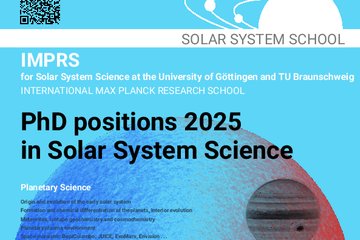Emeritus Symposium in Honor of Prof. Dr. Ulrich Christensen
Scientists from around the world came together in Göttingen to celebrated Christensen's contributions to the study of planetary interiors.
It was a farewell that had been a long time coming. Three years and two days, to be exact. In March 2020, the celebration of the retirement of Prof. Dr. Ulrich Christensen, Director at the Max Planck Institute for Solar System Research (MPS), had had to be cancelled due to the COVID-19 pandemic. Now, with a delay of several years, it has been made up for. Companions from Germany and abroad took advantage of yesterday's Emeritus Symposium, titled "The Deep Interior of Planets," to pay tribute to Christensen's scientific contributions to this field of research and to wish the long-time director at the MPS all the best on his future (also scientific) path.

About 65 participants from the MPS, from neighboring research institutions in Göttingen and Braunschweig, and from abroad were welcomed by Prof. Dr. Laurent Gizon, Managing Director of the MPS, at the beginning of the symposium in the MPS auditorium. Additional guests were connected online. While several presentations highlighted new findings on the deep interior, rock mantle and crust of Earth-like planets, Prof. Dr. Julien Aubert of the Institut de Physique du Globe in Paris looked back and outlined Christensen's most important scientific contributions.
From 2002 to 2020, Prof. Dr. Ulrich Christensen had headed the "Planets and Comets" department of the MPS, where he helped shape decisive changes and developments. To reflect the new research focus, the institute changed its name from Max Planck Institute for Aeronomy to Max Planck Institute for Solar System Research during this time and relocated from Katlenburg-Lindau to its current location near the University's North Campus in Göttingen in 2014. Also during this time, numerous space missions to which the MPS had contributed experienced their most exciting phases, such as the comet mission Rosetta, the Saturn mission Cassini, and the Mars missions Phoenix and InSight. In some cases, they provided important measurement data that helped to better understand the interiors of these bodies.
Christensen had already turned his attention to the interior of the Earth during his doctorate at the Technical University of Braunschweig and his subsequent habilitation at the University of Mainz. While he was initially interested in the processes in the Earth's mantle, he later focused increasingly on the dynamic processes in the iron core of our planet. In a kind of dynamo process, violent upheavals of the liquid and conductive iron there generate the Earth's magnetic field. One of Christensen's research goals is to simulate and thus understand these processes in numerical calculations. These considerations are also important for the understanding of other planets. In addition to the Earth, Mercury, Jupiter, Saturn, Uranus, Neptune, and some of their icy moons also have magnetic fields. And also Mars may have belonged to this group in the past.
Christensen's findings in this field have been recognized by numerous awards in the past. Among the most important honors are the Gottfried-Wilhelm Leibniz Prize of the German Research Foundation, the August Love Medal of the European Geosciences Union, the Inge Lehmann Medal of the American Geophysical Union, and membership in the National Academy of Sciences.
Luckily, the symposium did not mark a real farewell. Prof. Dr. Ulrich Christensen will continue to lead the Emeritus Group "Interior of Planets" at the MPS until 2024. And as he revealed, even after that he will continue to be at the MPS on a regular basis and continue his research.












